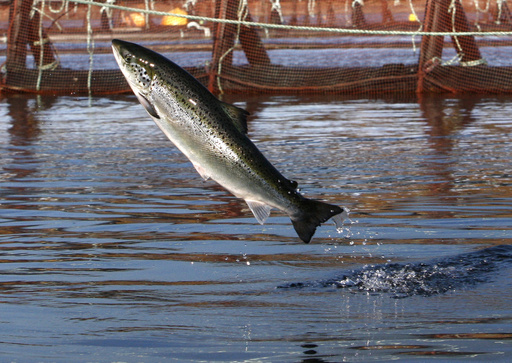
PORTLAND, Maine — An environmental advocacy group has announced its intention to sue one of the leading aquaculture companies globally, citing breaches of the Clean Water Act in Maine. The company, Cooke Aquaculture, has strongly rejected these claims.
The Conservation Law Foundation asserts that Cooke’s salmon farming operations along the Maine coast are damaging local ecosystems, particularly the bays crucial for the lobster fishing industry. The company utilizes netted pens in offshore waters to cultivate Atlantic salmon, which is a popular food source.
In a notice issued on Thursday, the Boston-based organization indicated that it would file a lawsuit in federal court in Maine to compel Cooke to adhere to environmental regulations. The foundation notes that the aquaculture facilities are responsible for discharging various pollutants, including fish waste, deceased fish, and other debris into the coastal waters of Maine.
“These massive salmon cages function like sewage conduits for the ocean ecosystem,” stated Heather Govern, vice president of the foundation’s clean air and water initiative. “Their waste materials suffocate aquatic plants and wildlife, and outbreaks of diseases along with sea lice pose a significant threat to the nearby at-risk wild salmon populations.”
In response, Cooke Aquaculture swiftly refuted the allegations, insisting that the company operates within legal bounds. Representatives for the firm, headquartered in New Brunswick, Canada, emphasized that the salmon farms undergo regular inspections by state authorities and are subject to ongoing compliance monitoring.
“Finfish aquaculture has peacefully existed alongside traditional fisheries, including lobster fishing, in Maine’s waters for over four decades. The presence of Atlantic salmon farms does not adversely impact lobster catch rates,” said the company in a public statement.
As a worldwide leader in aquaculture, Cooke claims to be the largest privately held seafood company globally, operating across 14 different countries. Over the years, Cooke has faced scrutiny from multiple environmental organizations, including the Sierra Club, which have raised questions about the sustainability practices of its operations in Maine and in other regions.
Sebastian Belle, executive director of the Maine Aquaculture Association, expressed his surprise at the Conservation Law Foundation’s litigation strategy, noting that the organization has previously collaborated with salmon farmers to set environmental standards. “Considering that CLF and its associated groups have not communicated their concerns to the farmers and that all parties are likely to gain financially, one must question why these farmers would continue to collaborate with such groups to address their issues,” Belle remarked.
